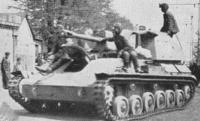If I could be young again I would fight for the freedom once again
Mr. Alexander Zaslocky was born on March 19th 1923 in Zdolbunov village in Ukraine Volhynia. Gradually he attended both, Czech and polish school and after the Soviet occupation in 1939 also Russian school. After the arrival of the German army in 1941 he has been set for forced labor. He worked as a turner in train depot until the regress of the Soviet troops. On March 1944 he ran away from the depot and applied to the Red Army in Rivne town. He has been trained in Kiverce and by Kamenets Podolsky in Galicia region. After the training he started by the first segregate Czechoslovakian regiment as a tank operator. Due to a difficult landscape not suitable for tanks he couldn’t help during the Dukla Pass battle. He went to Kezmarok (Slovakia) and with his tank unit continued to Czechoslovakia suffering from the occupation. He participated in all three parts of the so-called Ostrava operation (Fights in Ostrava town) and helped by breaking of the German defense. He entered Ostrava town on April 29th 1945 and together with his tank brigade was placed on the Ostrava stadium. From here they were gradually transferred to Vysoke Myto and Sternberk towns. He remained an active army officer until 1960 and after that he worked as an Army Academy teacher. He never entered the Communist party and holds the Colonel position today.
